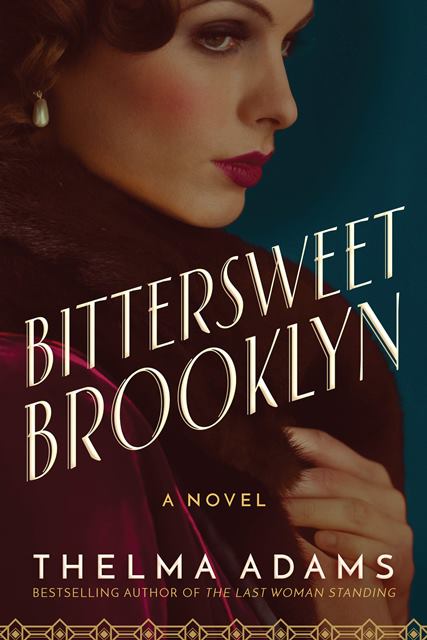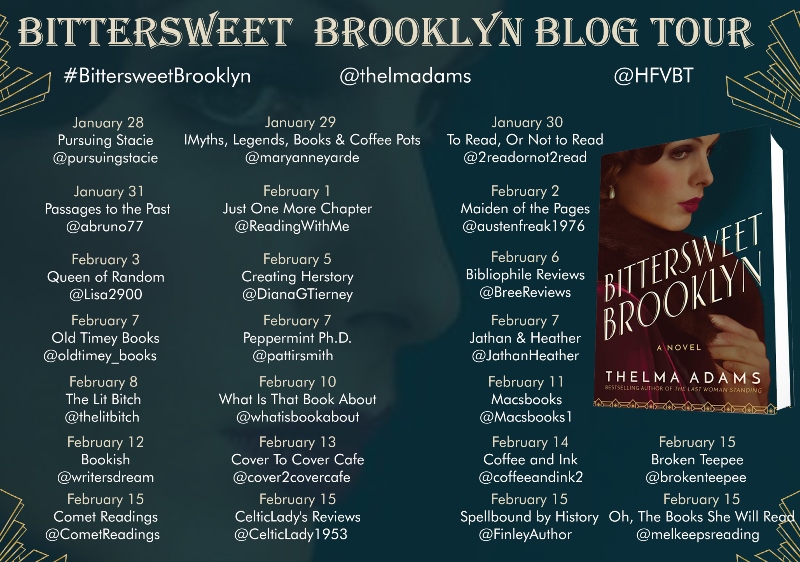
Publication Date: November 6, 2018
Lake Union Publishing
Paperback, eBook & Audio
Genre: Historical Fiction
In turn-of-the-century New York, a mobster rises—and his favorite sister struggles between loyalty and life itself. How far will she go when he commits murder?
After midnight, Thelma Lorber enters her brother Abie’s hangout under the Williamsburg Bridge, finding Jewish mobster Louis “Pretty” Amberg in a puddle of blood on the kitchen floor. She could flee. Instead, in the dark hours of that October 1935 night before the dawn of Murder, Inc., she remains beside the fierce, funny brother who has nurtured and protected her since childhood. There are many kinds of love a woman can feel for a man, but few compare to that of the baby sister for her older brother. For Thelma, a wild widow tethered to a young son, Abie is the center of her world. But that love is about to undo everything she holds dear…
Flipping the familiar script of The Sopranos, Boardwalk Empire, and The Godfather, Bittersweet Brooklyn explores the shattering impact of mob violence on the women expected to mop up the mess. Winding its way over decades, this haunting family saga plunges readers into a dangerous past—revealed through the perspective of a forgotten yet vibrant woman.
Amazon | Barnes and Noble
Brooklyn, October 1935
It’s tough torching a fresh corpse, so the Williamsburg Boys Club killers stuffed their shredded victim into the back of a Buick. They’d douse the stolen car with gasoline and ignite it. Then, at least, the cops would suffer distinguishing the upholstery from the body. It wasn’t pretty, but it was Louis “Pretty” Amberg in the back of that green sedan on October 23, 1935.
Amberg was no near-and-dear to Thelma Schwartz. The thirty-three-year-old hadn’t met the mobster while he was still alive, swilling vodkas at her older brother Abie’s Brooklyn hangout beneath the ramp to the Williamsburg Bridge. But she’d heard stories about the mean drunk with the lazy left eye. Abie’s gang said the Russian immigrant had good table manners, meaning the opposite: he’d stuck a fork in Milton Berle’s face when the performer had insulted Pretty’s bulldog mug from the Vanity Fair Club stage.
Word to the wise: never sit in the front row at a comedy show.
Unlike Pretty’s eyes, Thelma’s were her second-best feature: glowing green below arched eyebrows and thick auburn hair. A skinny widow with a kid, she knew she got looks when she wore lipstick and stiletto heels and bent over, showing a neckline more daring than the next. And those looks improved as the night wore on. Her best feature: her legs. Like everybody else’s, they began at her ankles and connected to her hips—but they took their sweet time. Her long limbs had magic in them, at least according to Abie.
That Wednesday, Thelma had dropped by Abie’s Marcy Avenue dive unannounced and desperate, fresh from being mauled by a bruiser in the alley behind the Arcadia Ballroom. Feeling raw and ashamed, she’d sought brotherly comfort—and cash. Late nights like this had left her with a female problem that Abie’s money might solve, if not soothe. When she was hurting, she turned to Little Yiddle, although she never used that nickname herself. It used to be that she was always welcome, but lately that had changed as her brother’s underworld “business interests” had appeared to expand.
She'd hurried down the two steps to the basement entry of the three-story redbrick building, strangling her lapels as the wind rose. Rocking from one foot to the other in thin-soled shoes, she regretted being on her brother’s doorstep. Turning, she glanced up and down the street to assess her exit, but she observed a stranger lurking in the shadow of the bridge. He hovered just beyond the circle of streetlamp light, a fedora sheltering his eyes.
As she watched, the man also shifted from one leg to the other in the frigid night. She was afraid of being alone in the dark without a man’s protection, but not as terrified as she was of being stuck at home with a kid every evening for the rest of her life. When Abie failed to answer, she let herself in with the spare key she kept for emergencies. She hung her coat on a hook before pouring a drink. After kicking off her heels under the octagonal card table, she settled down to play solitaire and nurse her grievances with a vodka neat (the poor person’s martini), when she heard grunts from the kitchen. She stayed seated, doing nothing to investigate the source, feeling nothing but trouble rising and her nape hair prickling under the clasp of her cheap heart-shaped locket.
After a while, Abie swung through the kitchen door, unrolling his sleeves.
“You gotta get out of here,” he said, his eyes dead, the whites red streaked. When she didn’t move, he became agitated. “Now! Grab your coat. Go!”
Thelma choked, stung by his betrayal and frozen by the gut punch of disgrace—the familiar emotion of being unloved and unlovable. “That’s some welcome, brother.”
“You don’t get it. Get outta here. I’m not kidding, kiddo.” His creased face gray and sweaty, Abie removed his handkerchief from his pants pocket and swabbed his brow. At forty-one, he was a very short, fit, bigheaded man with a strong chin, handsome between flappy ears that would have dwarfed a man twice his size. “This is for your own safety. Grab your stuff now, baby, and scram.”
She didn’t recognize this desperation, his frenetic urgency. “You’re calling me baby like I’m one of your cookies? Where am I supposed to go, Abie? I can’t find a cab this late and I’m broke.”
“Shh,” Abie hissed, looking over his shoulder. “Maybe you should have thought about that before.”
“Since when am I unwelcome?” she hissed back. She felt three years old, wet and weak. He’d always understood her. He’d always championed her. Who was she without her reflection as the favorite in his eyes?
One after the other, she’d made the choices that landed her here on Marcy Avenue in the bridge’s shadow on a dark block after midnight. She’d taken the risks, a widow trying to squeeze a spritz of joy from a cold night, packing up her cares and woes, feeling low and hoping she’d meet another man to rekindle her heart’s flame before it was too late. “You sound like Annie,” she said.
“Our sister wouldn’t be so dim to come here this late.”
“Kick a girl when she’s down.”
“Get in line. Take a number.” Abie fumbled for a cigarette. “You gotta learn to pick yourself up, Temmy. This is my last warning: get out.”
“I’ve always been here for you.”
“So now you’ve gotta shovel on the guilt? I’m your brother, for God’s sake.” He smacked his forehead, resigned, and then sank down beside the card table. Thelma slid an ashtray closer. He sighed, adding a smoker’s cough to its tail. “If you’re staying, Temmy, then pass me the deck. We'll play a hand while we wait. It’s probably too late anyway.”
It was 2:00 a.m. Abie riffled the deck on the felt. The cards scattered, escaping his jittery fingers.
“You’re shuffling like an old lady.”
He stopped and glared at her, the whites of his eyes wide. She’d never seen him so unhinged. She extended her hand. He flinched.
She began: “What can I—”
“Play cards.”
“Deal,” she said. He did.
Once the game started, Abie quietly unloaded, as if he were filling Thelma in on a radio serial she’d missed while she was out dancing. She reached over and removed the cigarette from his dry lips and placed it between hers. She puffed then discarded as he began to explain that Pretty had angled for control of the Brooklyn rackets, crossing the ambitious Louis “Lepke” Buchalter, who’d slain the Russian’s brother Joseph the previous month. Enraged, Pretty entered the rival gang’s headquarters, roaring that he’d be avenged. But Lepke struck first, telling Abie to set the trap by inviting the bereaved sibling over to the Marcy Avenue apartment that doubled as the Williamsburg Boys Club for drinks and girls.
The kitchen door swung open, revealing a husky, pockmarked man in his undershirt, his eyes feral.
“You didn’t get rid of her?” he asked, incredulous. “What, Little Yiddle, is this amateur hour? Bring me the girl.”
“She’s my sister. Leave her out.”
“Quit stallin’,” said the stack of bricks.
“I begged you, Temmy. I’m not the boss.”
“But we’re in your place.”
“Right, like I planned on opening a kosher butcher shop,” he snorted. “Just shut up and follow orders. You’ll be okay.”
“What’re my odds?”
He didn’t answer, so she crammed her blistered feet back into her heels and stood up. Whatever she was facing beyond the door, she was certain she wasn’t dressed for it. She yanked up her neckline, but it wasn’t getting any higher. Her heart pounded. With these party shoes and the corner guy, she wasn’t running anywhere this late in the game.
After squeezing Abie’s shoulder, steely beneath his shirt, she shoved the door with false bravado, sending it banging against the wall. She was trying to play it as cool as Jean Harlow in that Jimmy Cagney gangster movie Abie loved, The Public Enemy—but that didn’t last. The first thing she saw was an empty vodka bottle standing on the kitchen table beside three glasses, two empty, one full—the dead man’s glass.
And then she saw a corpse stretched on the floor. Even in her wildest imagination, this was not what she’d expected. She ran to the sink and puked.
“Don’t block the drain,” said the goon with a half smile, as if her terror amused him. “Take a last look, sister, but make it snappy. You got work to do.”
She swiveled, propping the small of her back against the sink. Beside the stove, the body lay on the checkerboard linoleum. She swallowed hard. Her palms sweat. She couldn’t see Pretty’s face. The assassins had rolled him into Abie’s bedspread, his wing tips visible, feet splayed. Although she knew he was no angel, she felt pity viewing his Florsheims. She’d been aware her brother broke the law, but this was murder: she’d stumbled into a crime scene with a victim whose name she knew. She was an accessory after the fact, abetting a felony, a loose end. She turned and spewed in the sink again.
Pretty was Jewish, like she was, an immigrant like her European parents. Now he’d been reduced to a flesh puddle on the ass end of Williamsburg. This was where they’d ended up: Jews killing Jews before the Gentiles had a chance. Thelma refused to believe that they’d become the embodiment of the crude caricatures anti-Semites published in the city’s broadsheets. But she couldn’t explain this: the man in the chenille wrapper. One bloodstained shoelace had come undone. Red gore like a cow’s afterbirth splashed the floor.
The pockmarked stranger handed Thelma a bucket and mop. She raised her hand to refuse, but the man shook his head no. Apparently, if she was there, they were going to use her—the story of her life. Maybe the killers had to tie her to the crime or flay her, too. She glanced from the gore to the goon, unable to figure out how she was going to clean her way out of this mess, but when he said, “Quit stalling,” she realized she’d rather scrub than be rubbed out and join Pretty.
Looking away from the stranger, Thelma removed her good dress and stripped to her slip, as if she were about to clean her mother’s kitchen floor. She threaded her hem through her bra so the fabric wouldn’t absorb the blood. Her protruding ribs humiliated her—but this wasn’t the situation for vanity. Nobody would be ogling her flesh that night.
With Pretty’s cheap cologne still clinging to the air, she mopped up the dead man’s body fluid, which turned the rinse water pink. After a while, she hoisted the heavy bucket and sloshed the filth into the sink and, retching, her eyes stinging with sweat and tears, refilled it again and again. Just when she sighed in relief that she was almost done, she spied splashes on the underside of the baseboard, on the insides of the table legs.
A second stranger with a sandpapery voice entered while she knelt, searching out stains with an old rag. She observed the guys’ ankles as they muscled the body from the room. They should have called him Lumpy, not Pretty, the thugs kvetched. When the back door slammed, she rose, grabbed the third glass, and gulped the dead man’s vodka before leaving the kitchen in bra and soiled slip. The shock began to diminish as the liquor did its work. But the horror increased.
From his armchair, Abie spat smoke and said, “Get dressed.”
“I hadn’t thought of that.” She carried her crumpled clothes before her, heels in her left hand. Red had been her favorite color. Not anymore. Entering Abie’s bedroom, she noticed the way the bedspread had been stripped away, revealing the shabby, torn sheets beneath. She’d bet his linen was clean over at his apartment on Rodney Avenue, but he still didn’t want anything to do with Tillie and their son.
Zipping her dress, she kicked herself for dropping by after midnight, for assuming Abie needed her as much as she did him. How could she ever look up to her brother again after scrubbing a corpse from his kitchen floor?
~~~~~~~~~~~~~~~~~~~~~~~~~~~~~~~~~~~~~~~~~~~~~~~~~~~~~
 Thelma Adams is the author of the best selling historical novel The Last Woman Standing and Playdate, which Oprah magazine described as "a witty debut novel."
Thelma Adams is the author of the best selling historical novel The Last Woman Standing and Playdate, which Oprah magazine described as "a witty debut novel."In addition to her fiction work, Adams is a prominent American film critic and an outspoken voice in the Hollywood community.
She has been the in-house film critic for Us Weekly and The New York Post, and has written essays, celebrity profiles and reviews for Yahoo! Movies,The New York Times, O: The Oprah Magazine, Variety, The Hollywood Reporter, Parade, Marie Claire and The Huffington Post. Adams studied history at the University of California, Berkeley, where she was valedictorian, and received her MFA from Columbia University.
She lives in upstate New York with her family.
Website | Facebook | Twitter | Goodreads | BookBub
Giveaway
Bittersweet Brooklyn

Terrific post! I loved this book!
ReplyDelete